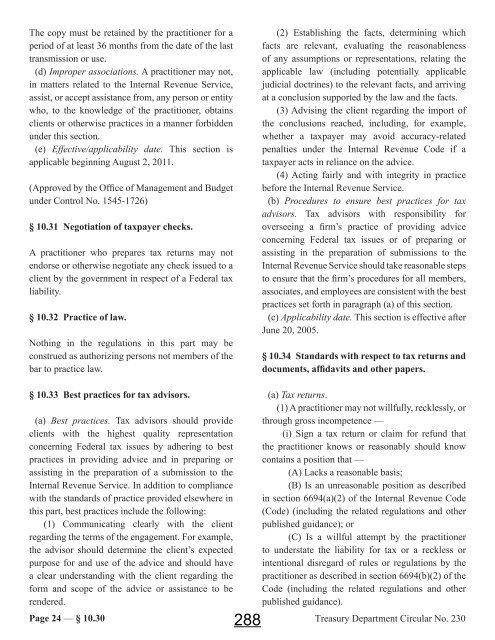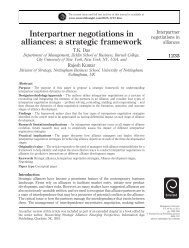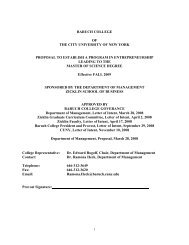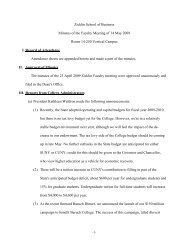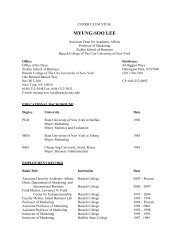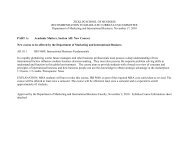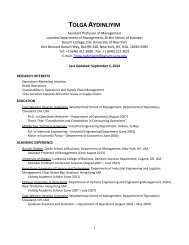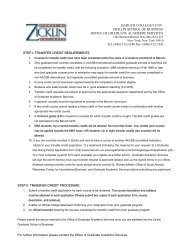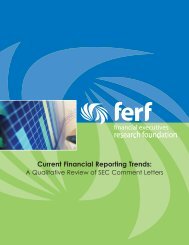Tax Seminar #3 – December 3 2012
Workbook - Zicklin School of Business
Workbook - Zicklin School of Business
Create successful ePaper yourself
Turn your PDF publications into a flip-book with our unique Google optimized e-Paper software.
The copy must be retained by the practitioner for a<br />
period of at least 36 months from the date of the last<br />
transmission or use.<br />
(d) Improper associations. A practitioner may not,<br />
in matters related to the Internal Revenue Service,<br />
assist, or accept assistance from, any person or entity<br />
who, to the knowledge of the practitioner, obtains<br />
clients or otherwise practices in a manner forbidden<br />
under this section.<br />
(e) Effective/applicability date. This section is<br />
applicable beginning August 2, 2011.<br />
(Approved by the Office of Management and Budget<br />
under Control No. 1545-1726)<br />
§ 10.31 Negotiation of taxpayer checks.<br />
A practitioner who prepares tax returns may not<br />
endorse or otherwise negotiate any check issued to a<br />
client by the government in respect of a Federal tax<br />
liability.<br />
§ 10.32 Practice of law.<br />
Nothing in the regulations in this part may be<br />
construed as authorizing persons not members of the<br />
bar to practice law.<br />
(2) Establishing the facts, determining which<br />
facts are relevant, evaluating the reasonableness<br />
of any assumptions or representations, relating the<br />
applicable law (including potentially applicable<br />
judicial doctrines) to the relevant facts, and arriving<br />
at a conclusion supported by the law and the facts.<br />
(3) Advising the client regarding the import of<br />
the conclusions reached, including, for example,<br />
whether a taxpayer may avoid accuracy-related<br />
penalties under the Internal Revenue Code if a<br />
taxpayer acts in reliance on the advice.<br />
(4) Acting fairly and with integrity in practice<br />
before the Internal Revenue Service.<br />
(b) Procedures to ensure best practices for tax<br />
advisors. <strong>Tax</strong> advisors with responsibility for<br />
overseeing a firm’s practice of providing advice<br />
concerning Federal tax issues or of preparing or<br />
assisting in the preparation of submissions to the<br />
Internal Revenue Service should take reasonable steps<br />
to ensure that the firm’s procedures for all members,<br />
associates, and employees are consistent with the best<br />
practices set forth in paragraph (a) of this section.<br />
(c) Applicability date. This section is effective after<br />
June 20, 2005.<br />
§ 10.34 Standards with respect to tax returns and<br />
documents, affidavits and other papers.<br />
§ 10.33 Best practices for tax advisors.<br />
(a) <strong>Tax</strong> returns.<br />
(1) A practitioner may not willfully, recklessly, or<br />
(a) Best practices. <strong>Tax</strong> advisors should provide through gross incompetence —<br />
clients with the highest quality representation<br />
(i) Sign a tax return or claim for refund that<br />
concerning Federal tax issues by adhering to best the practitioner knows or reasonably should know<br />
practices in providing advice and in preparing or contains a position that —<br />
assisting in the preparation of a submission to the<br />
(A) Lacks a reasonable basis;<br />
Internal Revenue Service. In addition to compliance<br />
(B) Is an unreasonable position as described<br />
with the standards of practice provided elsewhere in in section 6694(a)(2) of the Internal Revenue Code<br />
this part, best practices include the following:<br />
(Code) (including the related regulations and other<br />
(1) Communicating clearly with the client published guidance); or<br />
regarding the terms of the engagement. For example,<br />
(C) Is a willful attempt by the practitioner<br />
the advisor should determine the client’s expected to understate the liability for tax or a reckless or<br />
purpose for and use of the advice and should have intentional disregard of rules or regulations by the<br />
a clear understanding with the client regarding the practitioner as described in section 6694(b)(2) of the<br />
form and scope of the advice or assistance to be Code (including the related regulations and other<br />
rendered.<br />
published guidance).<br />
Page 24 — § 10.30<br />
288<br />
Treasury Department Circular No. 230


